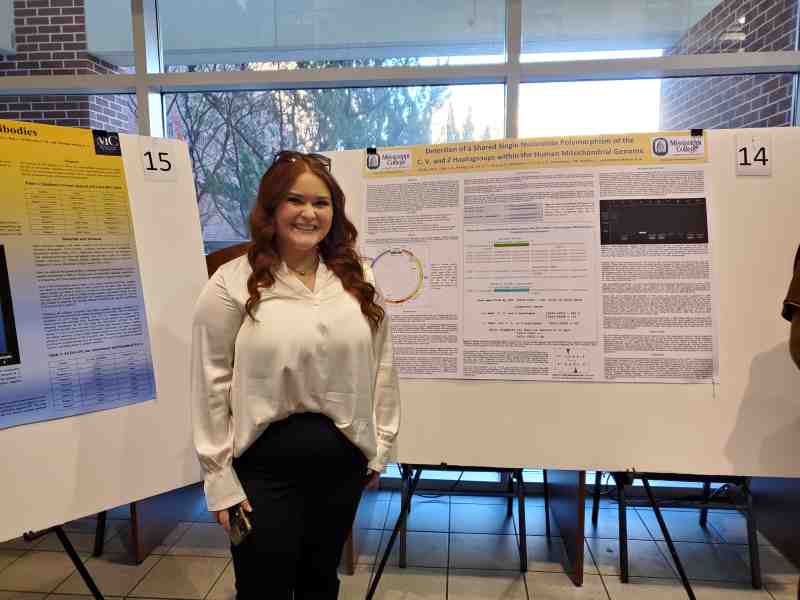Second STEM Fall Research Symposium Highlights Leading Discovery Projects at MC

Leading research projects conducted by some of the sharpest scientific minds among undergraduate and graduate students at Mississippi College were showcased Nov. 19 during a symposium sponsored by MC’s Office of Research.
Students in the School of Science and Mathematics at MC submitted abstracts and presented posters at the second Mississippi College STEM Fall Research Symposium. The event, which debuted in 2019, highlighted research projects conducted throughout the previous year.
Dr. Angela Whittom Reiken, assistant professor of biological sciences, said 22 participants – from new researchers with one semester of data to seasoned researchers with multiple semesters of data – presented projects in physical and biological sciences. Their research will be published in the symposium program that will be available during the spring semester.
“Participating in research is important because it can help our students boost their future careers by demonstrating skills in high demand, such as problem-solving, attention to detail, time management, and critical thinking,” Reiken said. “The symposium is a great way to recognize and support STEM research students at Mississippi College because it opens the door for additional opportunities, including sharing findings and receiving feedback, networking, and building communication skills.”
Hunter Matkins, a junior biology major from Hickory Flat, said the symposium was an ideal opportunity for students at MC to discuss their work in a controlled, welcoming environment.
“Science can be daunting,” he said, “and it was a comforting experience to simply show what you have been doing to students and teachers that offered both words of encouragement and support. Furthermore, the event allowed students to get acclimated to presenting as they may present to other locations and audiences.”
Symposium attendees voted for their favorite projects, and the individual presenters who received the most votes were honored with People’s Choice Award certificates. First-place presenters also received $50, second-place presenters received $30, and third-place presenters received $20.
Matkins said winning first prize in the biological sciences category for his presentation, “Test Anxiety is Associated with a Decreased Error-related Negativity in Tasks Requiring Top-down and Bottom-up Attention,” was truly a blessing.
“It was so exciting to see the interest students at MC had on this research,” he said. “I think this is because, as students, we know the impact test anxiety can have. As a result, we are curious about how it occurs and what goes on during it all.
“We sought to distinguish what type of processing test anxiety fell under. Through this, we wanted to see if test anxiety, in particular, was a hyper-fixation on errors. However, from our results, the processing would suggest that test anxiety could be more of an issue with error detection where test-anxious individuals are unable to detect and therefore correct their errors.”
Makenzie Phillips took second prize in biological sciences for “Detection of a Shared Single Nucleotide Polymorphism of the C, V, and Z Haplogroups Within the Human Mitochondrial Genome,” while Joseph Prize and Bryden Herring each received third prize for their presentation, “Evaluation of a Single Nucleotide Polymorphism in the Human TAS2R38 Gene to Predict Bitter Tasting Ability.”
In the physical sciences category, Kaylee Hood, a sophomore pre-physical therapy major from Madison, took first prize for her presentation, “The Conventional Strain Energies of Cyclopropylborane, Borirane, Boretane, the Diboretanes, Barolane, the Diborolanes, Borinane, and the Diborinanes.” Lillian Sisson received second prize for “Chemical Analysis and Biotoxicity Assessment of Plastic Bioremediation Using Tenebrio Molitor Larvae,” while Bailey Steen took third place for “Preparation of Macrocyclic Polyphenylethynylarene Ethers.”
“It meant a lot to me to win the People’s Choice Award for chemistry because it showed that I had been effective in my presentation,” Hood said. “It made me feel like I was successful in my portrayal of the information in a way that made sense to each group that I talked to.
“I think the symposium helps encourage research at MC by making the presentation aspect of research more fun. It can be intimidating to present information in front of people at competitions and meetings, so it is helpful to have experience presenting in front of people that you know. Having my friends there to give feedback on my presentation helped me improve my discussion of my project for my later presentations.”
The Medical Dental Alumni Association also selected the top two research projects at the event. The MDAA awards recognize all of the researchers and faculty mentors who worked on the winning projects. Each research team will receive $250 and a plaque during the 2022 MDAA meeting to note their accomplishment.
The research projects selected for the MDAA research awards included:
“Conventional Strain Energies of Thiaziridine and the Thiazetidines,” from the Department of Chemistry and Biochemistry. The poster was presented by Joshua D. Gramm and Dr. David Magers served as project mentor.
“Establishing a Drosophila Melanogaster Model for Studying the Effects of Dietary Lipids on Growth, Development, and Behavior,” from the Department of Biological Sciences. The poster was presented by Rebecca L. Grewe and Ethan L. Tullos, and Dr. Jerry Reagan served as project mentor.
Sign-up For Our Newsletter
Get the latest news about Mississippi College delivered right to your inbox by subscribing to the Along College Street e-newsletter.


